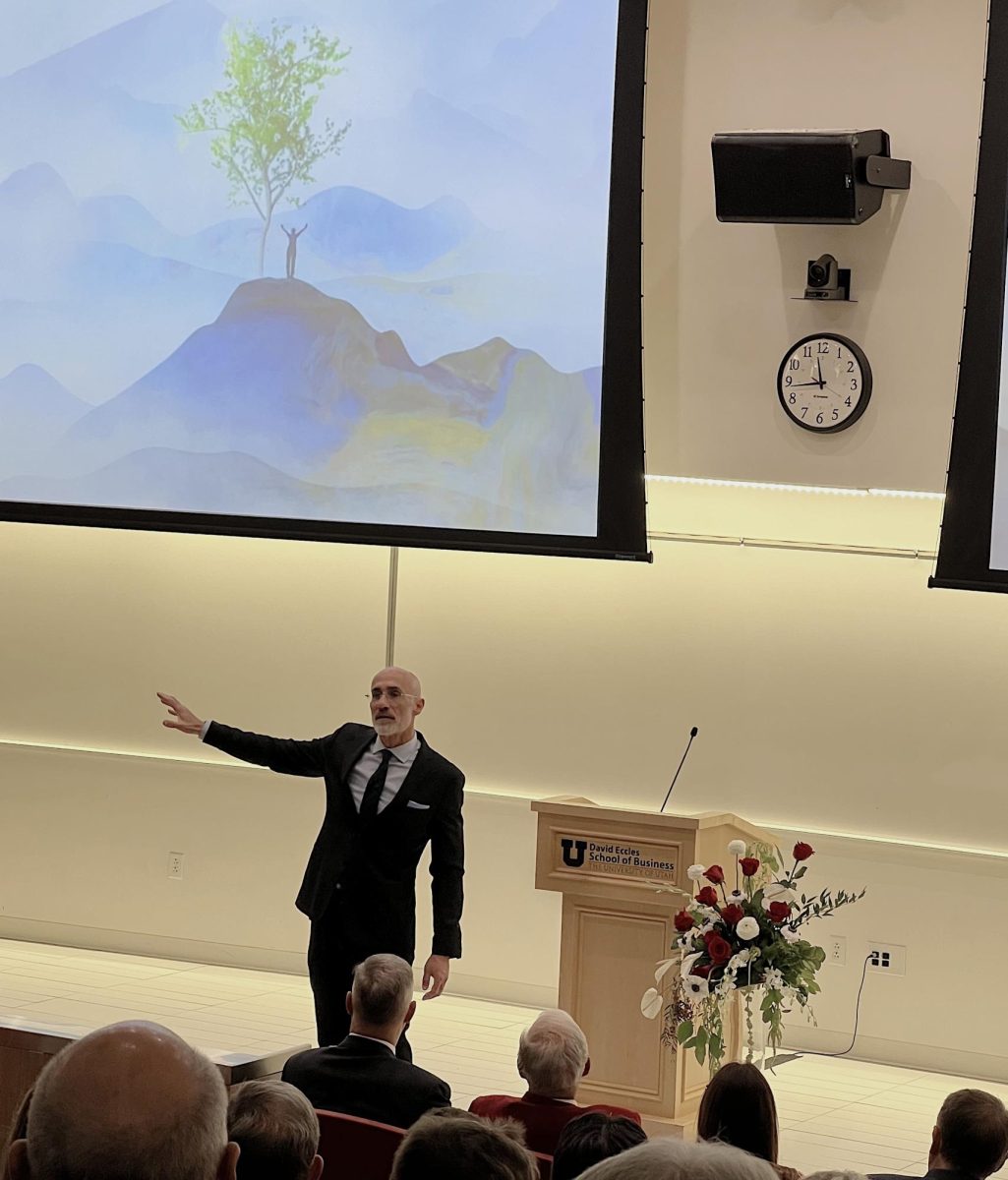Dr. Arthur Brooks shared the ultimate truth about happiness at the 34th Annual Spencer Fox Eccles Convocation on Sept. 12. Brooks was chosen by the David Eccles School of Business to speak on his experience as a social scientist studying the musculature of happiness.
The convocation began, as hundreds of students, faculty and trustees flooded the auditorium, with a few words from the new dean of the Business School, Kurt Dirks. He spoke about the excitement of being a part of his first convocation as dean and his dedication to the Business School’s success. University of Utah President Taylor Randall gave an animated introduction to Spencer Fox Eccles himself, who was seated in the front row.
He told an anecdotal story about how Eccles spent his 90th birthday on a motorcycle with the football coach. Randall turned to him and said, “We need you for another 90 years, so don’t do that Spence.” Eccles was then greeted with a standing ovation.
Happiness is Not a Feeling
Brooks, the 2022 Impact Scholar recipient, Harvard Professor and best-selling author, was introduced as the keynote speaker. Brooks recently published a book with Oprah Winfrey entitled “Build the Life You Want.” The book acts as a roadmap to “the art and science of getting happier,” and is an epic collaboration between Brooks’ academic interest in happiness and Winfrey’s mass media presence.
He paid homage to his co-author with a slight jab to his own celebrity.
“I know why you’re here. You heard that there’s a book by Arthur Brooks and Oprah Winfrey and the author’s on campus … sorry, it’s the other one. Oprah is here in spirit though,” Brooks said.
Brooks then introduced the idea of “happiness” as the focus of his lecture.
“Happiness is not a feeling,” Brooks said.
He went on to use the fact that the smell of turkey is not Thanksgiving dinner itself, but the evidence of dinner, to illustrate his point that the feeling of happiness is not inherently happiness itself.
Macronutrients of Happiness
Facing a confused audience, he elaborated on this metaphor by defining the “macronutrients of happiness.”
He began by discussing enjoyment and popping the bubbles of everyone in the audience by saying, “You can always be happier, but you will never be perfectly happy.”
He spoke about the necessity of negative experiences to learn and grow from the lessons of life. Those experiences help shape who we are as people as our frontal lobes develop, he said.
“The prefrontal cortex is not fully formed in women until age 21, and in men, until age 70,” Brooks said.
His next nutrient was satisfaction. He defined this as the joy humans get from doing hard things. He mentioned that the most successful people he has met dedicate their achievements to their hardships and talk about the dark sides of their journeys. No one is happy forever because it is something that we must continually work at to sustain. Brooks said the common phrase used during engagements to illustrate this idea.
“’If you marry me, I’ll be happy for the rest of my life.’ No, you won’t, that’s not how marriage works,” Brooks said. He instilled that delayed gratification and managing your wants are the best ways to maintain life satisfaction.
The final part of the happiness formula is meaning, or the “why of life.”
Brooks believes it is so important, that it is the focal point of his next book, which he announced is set to be released in 2026. The discovery of the meaning of life is determined by two questions according to Brooks: “Why are you alive?” and “For what would you happily give your life right now?” He said that if you can’t answer these questions, then that is why happiness is not filling you up.
You Are Not the Star of Your Own Psychodrama
Following the lecture, Dr. Brooks opened the forum to questions. One audience member asked about how his research applies to his professional life. Brooks responded with a list of four non-negotiables for his actions. He asks himself, “Do they glorify God, serve others, make for fun adventures and are they good for business?”
Brooks closed out the convocation with a formula. He spoke about the incorrect formula for happiness that is believed by most of the world: “Use people, love things, worship yourself.”
“Mother nature makes you the star of your own psychodrama,” Brooks said. “This is not true.”
He explained that society has mixed the verbs and nouns to create a different message than the intended one: “love people, use things, and worship the divine.”
Brooks concluded by alluding that as humans, we are all meant to worship something, but the only way to acquire a truly happier existence is to believe in “the ultimate truth” which is that “happiness is love.”



